This update is from Rod Matthews, GCI’s mission developer for SE Asia.
Death of Karen Elder

It is with deep sadness and concern for our Karen members in a camp in Thailand that I report the death of Moolah Shi on January 27 at the age of 72. He served the Karen members with dedication, humility and faithfulness for over 30 years. He is survived by his wife, Kushi and five children. He was baptized by John Halford in 1978, ordained a deacon in 1986 and an elder in 1996. Moolah Shi once served as an officer in the Karen National Union (KNU), a liberation movement in conflict with the Burmese army in his homeland of Myanmar. He was related through marriage to one of the top Karen generals and found himself in a difficult situation as he was called of God, came to understand the scriptures and developed a relationship with his Creator. He started reading The Plain Truth magazine in 1970 when a Baptist minister shared it with him. Ultimately, he and a number of associates in the KNU were discharged from the organization due to their hearts not being in the revolution.
With thousands of other Karen people, he found himself a refugee in Thailand, restricted to a corridor along the border with Myanmar, unable to gain Thai citizenship or equivalent benefits. His heart for his people and their welfare was demonstrated again when he became heavily involved with the Karen Refugee Committee set up to assist the Thai authorities in managing the refugee camps established along the border in Thailand and holding tens of thousands of mainly ethnic Karen people fleeing the fighting in Myanmar.
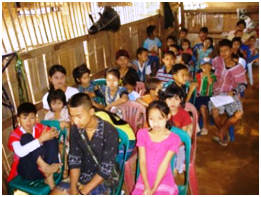 As a result of this advantageous position, he was relatively free to come and go from the camp where our congregation was located. Through personal family circumstances he found himself able to live outside the camp, more easily coordinating with the church leadership and conducting church business as well as visiting other non-camp members in that area.
As a result of this advantageous position, he was relatively free to come and go from the camp where our congregation was located. Through personal family circumstances he found himself able to live outside the camp, more easily coordinating with the church leadership and conducting church business as well as visiting other non-camp members in that area.
The camp congregation started with a foundation of ex-members of the KNU and their families and grew in numbers with a weekly attendance that at times reached about 80. In due course, some families were granted UN refugee status and were resettled overseas, and some were denied refugee status and remained stateless in the camp. In the last few years, the UN has made a concerted effort to resettle more Karen people in the hope that the refugee crisis along the border can finally be resolved. But as some are moved to new lives overseas, their places are often filled with economic refugees seeking a better life than what is available in Myanmar. And so today, our congregation still numbers around 50, with about half being children.
As pastor, Moolah Shi travelled to the camp regularly on a church-provided motorcycle to conduct services in our own church building, constructed on acquired land within the camp and built by the members with materials funded by the Australian churches. Southeast Asian senior pastor, Wong Mein Kong and I met with him in the nearby town of Maesot once each year and in most years were permitted to enter the camp to meet with our people and conduct worship services. I was always impressed that in spite of his remoteness, Moolah kept up with and embraced the doctrinal enlightenment in the church and, led by the Holy Spirit, provided humble, effective and faith-filled leadership in spite of the church’s difficult journey and our Karen family’s own physical deprivations. He was highly respected among all the Karen people and the Thais who knew and worked with him. He set a wonderful example of Christlikeness—patient, meek, faithful, encouraging and always dedicated to his people. Please pray for us as we move into a new phase of pastoral care for the congregation there. Actually, we might one day be thanking God that the congregation closes, which would mean that the refugee camps are no longer needed there. May God speed that day.
Bangladesh
I recently returned from visiting several of our groups and the mission center of GCI’s mission arm in Bangladesh, the Bengali Evangelical Association (BEA), accompanying its director, Dr. John Biswas. BEA supporter and southern California member, Ron Boyer joined us.
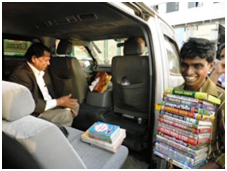
Our trip by auto takes us to a ferry across the Padma River (the Ganges in India). On the ferry, John Biswas tells a young bookseller (see picture at right) that he too once sold books to fund his education. When asked if he had heard of Jesus, the young man said he had—but all he knew about him was that he was a Christian! John offers him the opportunity to come with us—right there and then—and be employed in the physical care of our mission center with the promise of food and lodging and education. But the young man can’t bring himself to accept. So John buys a few of his books and gives him some extra taka (the local currency) with instruction to save it for his education—and the young man moves on.
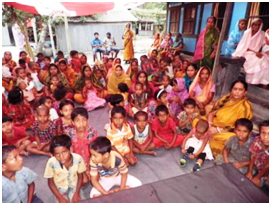
Late in the day we detour off the main road to visit the congregation at Anandapur. Nearly 60 people, mainly women and children since the men are working in the fields, are waiting to welcome us dressed in their beautiful best. We are honored with flowers and food and give short messages of encouragement before we move on. The next day there are now strikes in Barisal and we are advised to stay put for another day. That evening we meet with a little group of Christians in the hotel. It’s a delight to talk about the resurrection for a short while. They surprise me with a cake and gift celebrating my birthday two days earlier! I am struck with what a privilege it is to be visiting brothers and sisters in Christ in one of the most challenging and remote environments in which to be a minority Christian.
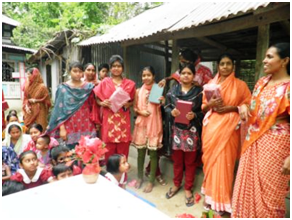
On Friday we set out early to visit two rural congregations I haven’t seen before: Batjor and Bagdha. At Batajor we were presented with flowers, a welcome song and a graceful dance. We brought Bengali Bibles and offered short encouraging messages. It’s amazing and humbling that God has chosen us to plant congregations of poor yet very responsive Bengali people in these remote rural locations in southern Bangladesh.
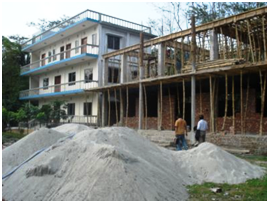 Later at the BEA mission center in the village of Sathsimulia, we were honored with a shower of flower petals as we entered the facility through an honor guard of members and workers. We are led to the chapel building for a short service and welcome ceremony. The compound is a hive of activity with construction under way for the new building that replaces the old original “Canadian” building which had to be demolished due to cyclone damage. A large part of the compound is taken up with piles of building materials as construction has reached the second level of the three-story building. It will stand as a partner to the Herman L. Hoeh building and will provide needed facilities and accommodations for the training of nurses’ aides and gospel workers and other outreach activities emanating from BEA’s mission center. Our sincere thanks to the many who have donated toward construction of this building, including many individuals, congregations in Canada, our denominational headquarters in Glendora and our Australian office.
Later at the BEA mission center in the village of Sathsimulia, we were honored with a shower of flower petals as we entered the facility through an honor guard of members and workers. We are led to the chapel building for a short service and welcome ceremony. The compound is a hive of activity with construction under way for the new building that replaces the old original “Canadian” building which had to be demolished due to cyclone damage. A large part of the compound is taken up with piles of building materials as construction has reached the second level of the three-story building. It will stand as a partner to the Herman L. Hoeh building and will provide needed facilities and accommodations for the training of nurses’ aides and gospel workers and other outreach activities emanating from BEA’s mission center. Our sincere thanks to the many who have donated toward construction of this building, including many individuals, congregations in Canada, our denominational headquarters in Glendora and our Australian office.
On our return to Dhaka, we met about 30 gospel workers from several of our groups so John Biswas could have opportunity to discuss plans for the year ahead, evaluate projects and assess the means to continue the outreach and evangelism in a wise and appropriate way in a most challenging environment. I encouraged them to let their already bright light shine.


